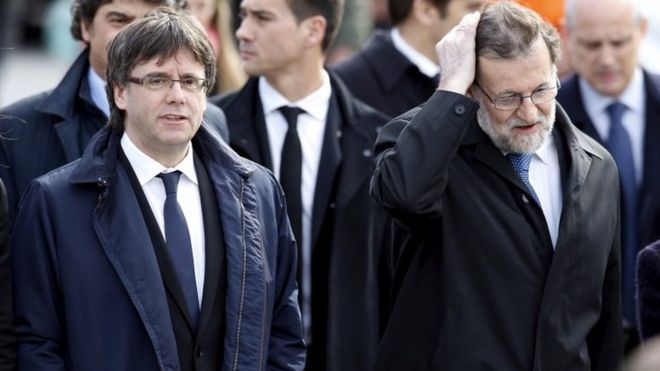
A final deadline for Catalonia to drop a secession bid has passed, with Spain warning it will suspend the region’s autonomy.
Catalonia’s leader Carles Puigdemont was given until 10:00 local time (08:00 GMT) to clarify his position.
After a referendum on 1 October, he signed an independence declaration but then suspended it, asking for dialogue.
Reports suggest he will press ahead on independence if Madrid moves to take direct control.
There are fears that this may lead to civil unrest in Catalonia.
Article 155 of Spain’s 1978 constitution, which cemented democratic rule after the death of dictator General Franco three years earlier, allows Madrid to impose direct rule in a crisis but it has never been invoked.
In the lead-up to the deadline, there have been mass protests over the detention of two leaders of the separatist movement.
Political leaders in Madrid and Barcelona have been engaged in a tense stand-off since the disputed referendum, which Catalan leaders say resulted in a “Yes” vote for independence but which the central government regards as illegal.
What is Madrid’s position?
Spanish Prime Minister Mariano Rajoy set the deadline for Mr Puigdemont to offer a definitive answer on the independence question, and called on him to “act sensibly”.
“It’s not that difficult to reply to the question: has Catalonia declared independence? Because if it has, the government is obliged to act in one way, and if it has not, we can talk here,” he said in parliament on Wednesday
This was the second and final deadline, as Madrid says Mr Puigdemont on Monday failed to clarify whether he had declared independence.
What happens now?
If Mr Rajoy decides that his government should intervene, he is expected to call a special cabinet meeting to discuss what specific measures should be taken.
He is due to attend an EU summit in Brussels on Thursday afternoon. It is possible a cabinet meeting could be called before he goes or postponed until Friday.
The government will then be expected to draw up a list of specific measures under Article 155 of the constitution, launching the transfer of powers from Catalonia to Madrid.
The article says: “If a self-governing community does not fulfil the obligations imposed upon it by the constitution or other laws, or acts in a way that is seriously prejudicial to the general interest of Spain, the government… may… take all measures necessary to compel the community to meet said obligations, or to protect the above-mentioned general interest.”
It is thought the measures taken could range from taking control of the regional police and finances to calling a snap election.
Spain’s Senate, controlled by Mr Rajoy’s conservative Popular Party (PP) and its allies, would then have to approve the list. The timetable for this process is imprecise.
Analysts say Article 155 does not give the government the power to fully suspend autonomy, and it will not be able to deviate from the list of measures.
For Madrid this is about upholding the rule of law in Catalonia, protecting the Spanish constitution and disciplining what it sees as an unruly, disobedient devolved government, the BBC’s Tom Burridge in Barcelona reports.
However, the central government wants to minimise the risk of large-scale demonstrations, our correspondent says. Civil servants and government lawyers have thought long and hard about what measures to adopt and when and how they should be implemented.
What are the Catalan leader’s options?
Reports in Spanish and Catalan media suggest Mr Puigdemont will move ahead with the independence bid if Madrid rejects his call for dialogue and suspends the autonomy of the wealthy north-eastern region.
He is under pressure from influential factions within the secessionist movement to lift the suspension of the independence declaration.
On Wednesday, Barcelona football fans called for political negotiations, unveiling a huge banner reading “Dialogue, Respect, Sport” during a Champions League match against Olympiakos from Greece.
Mr Puigdemont appears to have one more option.
If he calls elections in the region himself, Madrid would not invoke Article 155, government sources say.
This would allow Catalans to decide on their future in a way that was acceptable to the central government, unlike the referendum, analysts say.
But the foreign affairs chief for Catalonia’s regional government, Raul Romeva, said on Wednesday: “Elections are not on the table now.”
How much support does Mr Rajoy have in parliament?
As well as the ruling PP, Mr Rajoy has the support of the centre-left Socialists and centrist Cuidadanos (Citizens) on the Catalan crisis.
Between them they control at least 254 out of 350 seats in the lower house – the Congress of Deputies – and at least 214 out of 266 seats in the Senate.
However, there have been sharp exchanges in recent days, with the head of one left-wing Catalan party accusing the government of choosing humiliation, repression and fear over dialogue.
The radical left-wing Podemos party and other regional leftist groups are also opposed to the government position, and have protested against the detention of Catalan activists.
Source:BBC




